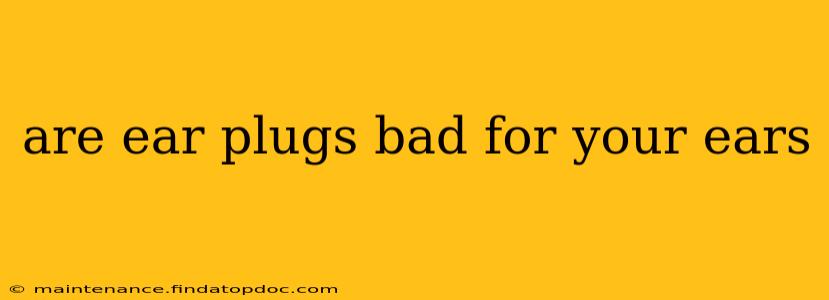Are Earplugs Bad for Your Ears? A Comprehensive Guide
The question, "Are earplugs bad for your ears?" is more nuanced than a simple yes or no. While properly used earplugs offer crucial protection against hearing damage, misuse or improper selection can indeed lead to some negative consequences. This guide will delve into the potential benefits and drawbacks of earplug usage, helping you make informed decisions about protecting your hearing.
Can Earplugs Cause Hearing Loss?
This is a common concern. While earplugs themselves don't directly cause hearing loss in the same way as prolonged exposure to loud noises, improperly fitted or used earplugs can potentially contribute to certain issues. For instance, poorly fitted earplugs might allow harmful noises to enter your ear canal, negating their protective function. Furthermore, inserting earplugs incorrectly can lead to irritation or even injury to the delicate skin of the ear canal. Using earplugs that are too large or too small can also cause discomfort and potentially impact hearing. The key is using the right earplugs correctly.
What are the Benefits of Wearing Earplugs?
The benefits of using appropriately fitted and selected earplugs significantly outweigh any potential drawbacks, especially when considering the irreversible nature of noise-induced hearing loss (NIHL). Earplugs are essential for protecting your hearing in various situations:
-
Protecting against Noise-Induced Hearing Loss (NIHL): This is the most significant benefit. NIHL is a leading cause of hearing impairment, often resulting from prolonged exposure to loud noises in work environments, concerts, or recreational activities. Earplugs dramatically reduce the intensity of sound waves reaching your inner ear, safeguarding your hearing health.
-
Improving Sleep Quality: Many people use earplugs to block out distracting noises at night, promoting better sleep. This is particularly helpful for those living in noisy environments or dealing with conditions like tinnitus.
-
Reducing Discomfort from Loud Noises: Earplugs can offer relief from uncomfortable or painful sounds, such as those encountered during travel, construction, or sporting events.
-
Protecting Against Water Entry: Certain types of earplugs, particularly those designed for swimming, offer protection against water entering the ear canal, which can lead to infection.
What are the Risks of Using Earplugs?
The risks associated with earplugs are primarily linked to improper use or selection:
-
Impacted Earwax: Improper cleaning of earplugs or using them for prolonged periods can sometimes lead to a buildup of earwax, potentially causing impaction.
-
Ear Infections: While earplugs themselves don't typically cause infections, introducing bacteria or fungi into the ear canal through dirty earplugs can increase the risk of infection.
-
Swimmer's Ear (Otitis Externa): Introducing water into the ear canal, even with earplugs, increases the risk of this infection, especially if the earplugs aren't properly dried after use.
-
Discomfort and Irritation: Poorly fitting or improperly inserted earplugs can cause discomfort, irritation, or even minor injury to the ear canal.
-
Custom-Made Earplugs & Potential Issues: While custom-fitted earplugs offer superior protection and comfort, some individuals may experience occasional discomfort or a feeling of pressure.
What Types of Earplugs are Available?
Several types of earplugs cater to different needs and preferences:
-
Foam Earplugs: Disposable, inexpensive, and readily available. They're effective for reducing noise but may not offer as much protection as other types.
-
Silicone Earplugs: Reusable, more durable, and often provide better noise reduction than foam earplugs.
-
Flanged Earplugs: These have multiple flanges that create a better seal in the ear canal.
-
Custom-Molded Earplugs: These are custom-fit to the individual's ear canal, offering superior comfort and noise reduction. They are more expensive but are ideal for frequent users.
How to Use Earplugs Safely and Effectively?
To minimize any potential risks, follow these guidelines:
-
Choose the Right Earplugs: Select earplugs appropriate for the noise level and duration of exposure.
-
Clean Your Earplugs Regularly: Clean your earplugs after each use with soap and water to prevent the buildup of bacteria and earwax.
-
Insert Earplugs Properly: Follow the manufacturer's instructions for proper insertion.
-
Don't Force Insertion: If you experience discomfort during insertion, stop and try again or use a different pair of earplugs.
-
Remove Earplugs Gradually: Avoid sudden removal to prevent possible ear canal injury.
In conclusion, earplugs are generally safe and highly beneficial for protecting your hearing from damaging noise levels. The key to avoiding any potential negative effects lies in selecting the appropriate type of earplugs for your specific needs and ensuring proper insertion, cleaning, and use. If you have any concerns about earplug use or experience persistent ear discomfort, consult an audiologist or healthcare professional.
